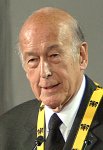Declaration of the Board of Directors of the Charlemagne Prize Society on the Awarding of the Charlemagne Prize to the President of the European Convention Valéry Giscard d’Estaing
 The decision of the European Council of Copenhagen opens the way for our continent to join together in comprehensive form. The Union of Fifteen awaits the imminent accession of ten more states. In this decisive phase when Europe is engaged in shaping its future, it is essential to invest the process of deepening with a new quality and dynamic. Now, over fifty years after the founding of the ECSC, it is time to give the Community a constitution and thereby the internal form enabling it to exercise a leading role in the world as a Political Union.
The decision of the European Council of Copenhagen opens the way for our continent to join together in comprehensive form. The Union of Fifteen awaits the imminent accession of ten more states. In this decisive phase when Europe is engaged in shaping its future, it is essential to invest the process of deepening with a new quality and dynamic. Now, over fifty years after the founding of the ECSC, it is time to give the Community a constitution and thereby the internal form enabling it to exercise a leading role in the world as a Political Union.
By instituting the Convention, the European Council of Laeken sent out an initial and impressive signal of willingness to undertake sweeping reforms. For this Convention also involves a future-orientated transformation of European policy and politics. In contrast to the past decades, the shaping of the Community by treaty no longer takes place solely in intergovernmental negotiations but also in public debate conducted for the most part by elected parliaments. At the beginning of the new century, the Union is thus acting to extend to the European level the measure of democratic efficiency that we take for granted in its member-states, and to implement it in transparent form.
In recognition of the eminent and historic task of developing for United Europe a constitution bringing the Community still closer to its citizens, the Board of Directors of the Society for Conferring the International Charlemagne Prize of Aachen honours in the year 2003 the President of the European Convention and former President of the French Republic, Valéry Giscard d’Estaing, who for decades and in varying functions has advanced the process of unification, and who together with the members of the Convention has become in recent months a decisive driving force for the "new" Europe.
Valéry Giscard d’Estaing was born on 2 February 1926 in Koblenz/Rhine and grew up in upper-middle-class circumstances. The family came from the Auvergne. After going to school in Clermont-Ferrand and Paris, he began academic studies (which were interrupted by a year of wartime military service in Germany) at the École Polytechnique and the celebrated École Nationale d’Administration (E.N.A.), graduating with honours.
Following a brief period as a civil servant in the Finance Ministry, Giscard d’Estaing began his parliamentary career on 2 January 1956 as Deputy to the National Assembly from the Départment of Puy-de-Dôme. Appointed state secretary (= permanent secretary in the UK, undersecretary in the US) in the Finance Ministry in January 1959, he was named to head the Ministry three years later, in January 1962. The largely successful policy of financial stabilization of that era is associated with his name; but differences arose with General de Gaulle, and in the formation of the second Pompidou cabinet at the turn of 1965-66 he had to yield his post to his successor Michel Debré. Elected party leader of the Independent Republicans shortly thereafter, he rejoined the government on 24 June 1969 as Economics and Finance Minister. After the death of Georges Pompidou, Giscard d’Estaing was elected President of the French Republic on 19 May 1974.
In foreign and European policy, Giscard together with the then German Federal Chancellor Helmut Schmidt constantly stressed Franco-German friendship not only as an important bilateral link but also as an engine of European understanding and coordination. Like their predecessors Charles de Gaulle and Konrad Adenauer and their successors François Mitterrand and Helmut Kohl, Schmidt and Giscard set widely visible signals of close cooperation. During his Berlin visit in October 1979 - the first visit by a French President to West Berlin - Giscard demonstratively reaffirmed the French guarantee for the city’s security and freedom.
Above all, however, it was the European Monetary System, proposed by the French head of state and the German Federal Chancellor in July 1978 and launched in 1979, which created a zone of increasing stability and was thus a major breakthrough on the way to a common European currency. For the first time, fixed rates of exchange, alterable if need be, were agreed for the currencies in the EMS. As a marker for these fixed exchange rates, and as a unit of account in the EC, the ECU was created: a monetary basket with a weighted combination of the currencies of states belonging to the EU before 1995. Discontinued in the course of launching the EURO and assimilated into the EURO on a 1 to 1 conversion rate, the ECU was thus the legitimate predecessor of the currency which since the beginning of the new century has put its unique stamp on the image of our continent.
In domestic policy, Giscard came under sustained pressure, due in part to a continuing high rate of unemployment. In the presidential elections of 1981 he scored 48 percent of the vote, losing by the narrowest of margins to his Socialist opponent François Mitterrand. At the end of his incumbency, Valéry Giscard d’Estaing initially retired from public life but returned in 1982 to active politics and successfully stood in March of the same year in the canton elections in Chamalières. In September 1984 in his constituency, Puy-de-Dôme, he regained a seat in the French National Assembly, becoming the chairman of its Foreign Affairs Committee.
Named new UDF president by acclamation in 1988, Giscard was elected in June 1989 to the European Parliament. He was back in the French National Assembly from March 1993 to 2002, again heading the Foreign Affairs Committee until 1997. In his capacity as Deputy to the National Assembly and as President of the Council of European Municipalities and Regions (from 1997), the former head of state regularly addressed questions of economic and finance and European policy. Widespread notice was attracted for example by his sharp criticism of the monetary policy of the Juppé government and the preparations for the European Monetary Union in 1966. Together with former Federal Chancellor Helmut Schmidt, he pleaded in April 2000 for sweeping institutional reforms and for clear priorities and clear distinctions in the process of enlargement of the European Union.
At the suggestion of the European Council of Laeken, Valéry Giscard d’Estaing assumed the chairmanship of the Presidium of the European Convention, which in February 2002 began its work in Brussels with a phase of hearings that included the participation of the membership candidates. Right from the outset, the historic importance of this Convention and its work was made clear by the eloquent Frenchman during his address of welcome:
"We can indeed dream of Europe, and persuade others to share that dream! If we were to fail, each country would return to the free trade system. None of us - not even the largest of us - would have the power to take on the giants of this world. We would then remain locked in on ourselves, grimly analyzing the causes of our decline and fall. Our call for enthusiasm goes out to other Europeans, but first and foremost to ourselves. We must have a passionate interest in the success of our task if we are to engage and persuade others. It is a task modest in form but immense in content, for if it succeeds in accordance with our mandate, it will light up the future of Europe."
The paradigm shift already effected in European policy solely by the Convention’s establishment subsequently became evident in sustained efforts to secure for it the broadest possible public outreach and to stay as close as possible to the people, in particular by the inclusion of numerous civic organizations. One plenary session in June, for example, was devoted solely to hearings of civic representatives; a month later, the European Youth Convention took place at Giscard’s suggestion - a visible sign of embarking on a new future.
In October 2000 the former French head of state presented a widely noted preliminary draft for a European constitution, which elicited even from critics praise and great respect. In eighteen pages the Convention President presented a structure adapting the treaty foundations of United Europe to the state of unification actually achieved, while at the same time pointing the way to a future of deepened integration. The preliminary draft consists basically of two parts: In the first complex, containing the charter of human rights developed under the leadership of Roman Herzog (Charlemagne Prize laureate in 1997), are outlined the principles and aims and powers of the EU and its institutions; the second part is devoted to individual policy areas and to the implementation of measures agreed by the Union.
Valéry Giscard d’Estaing has already received many awards of merit for his services: these include the Grand Cross of the Legion of Honour, the Grand Cross of the National Order of Merit of the Republic of France, and a knighthood of the Maltese Order. For his early and active involvement in the cause of the European Monetary Union, he received in 2001 - together with Helmut Schmidt - the Gold Medal of the Jean Monnet Foundation. The former head of state has been married since 1952 to Anne-Aymone de Brantés and has four children.
In the person of Valéry Giscard d’Estaing, President of the European Convention, the Board of Directors of the Society for the Conferring of the International Charlemagne Prize of Aachen honours in the year 2003 a great statesman and European, who over many decades and in varying functions has rendered distinguished service in the cause of United Europe and who together with the members of the Convention has now undertaken the eminent task of giving to this Community a new shape by developing a new treaty foundation. With the award go our hopes that by means of a common constitution, the Union will grow still more closely together, and that now - 40 years after the conclusion of the Elysée Treaty - the Franco-German partnership exemplified for decades by Valéry Giscard d’Estaing will continue to be a motive force of the European process of integration.
More Information in German.
Website of The European Convention




